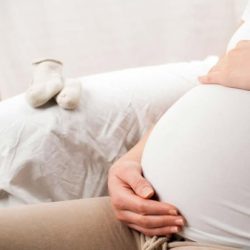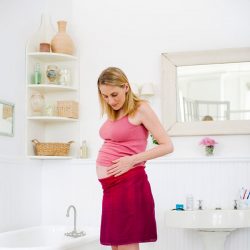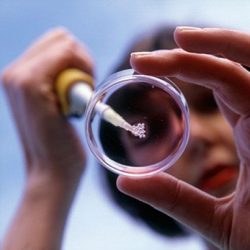Women who have high levels of abdominal fat during their first trimester of pregnancy have a higher risk of developing diabetes later in their pregnancy, according to a new study published in Diabetes Care. The study looked at nearly 500 women between 18 and 42 years old. Researchers found that those with higher levels of abdominal fat were at an increased risk of developing … [Read more...]
Fertility & Pregnancy News

Obese pregnant women who lose weight have healthier newborns: University of Texas Study
A recent study conducted by The University of Texas Medical Branch at Galveston shows that severely obese women who maintained or lost weight during pregnancy had healthier babies and lower health care costs. "The OB-GYN department is justifiably proud of this result, which required a lot of close attention to the mothers' prenatal care," said Dr. David McCormick, clinical … [Read more...]
Taming hot flashes without hormones: A Study
Some three-quarters of North American women have menopausal hot flashes, but many cannot use hormones for medical reasons or choose not to. Numerous products and techniques are promoted for hot flashes, but do they work, and are they safe? To answer these questions, a North American Menopause Society (NAMS) panel of experts weighed the evidence and made recommendations in a … [Read more...]
More precise due dates for pregnant mothers: Thomas Jefferson University Study
To the frustration of busy pregnant women everywhere, estimates of when she'll actually give birth can be off by as much as two to three weeks, early or late. This leaves women with a window of more than a month in which carefully laid plans can be thrown into disarray, with only 5 percent of women delivering exactly on their due date. A new meta-analysis suggests that one … [Read more...]
High stress during pregnancy decreases offspring survival: University of Exeter Study
Researchers studying banded mongooses in Uganda have discovered that pups born to females that experienced elevated stress hormones during the later stages of pregnancy are much less likely to survive their first month. Dr Jennifer Sanderson, now a science teacher at Bedminster Down School in Bristol, spent four years observing wild banded mongooses to understand the effects … [Read more...]
Pregnant women have highest levels of certain preservatives used in cosmetics: Arizona State University Study
Researchers at SUNY Downstate Medical Center and Arizona State University have published the first study of levels of parabens -- antibacterial substances commonly used as preservatives in cosmetics and other products -- in human cord blood samples. The researchers found that a cohort of pregnant women in Brooklyn predominantly of Caribbean- and African-American descent had the … [Read more...]
Researchers discover an epilepsy switch: An Israeli Study
Scientists at the University of Bonn and the Hebrew University of Jerusalem (Israel) have decoded a central signal cascade associated with epileptic seizures. If the researchers blocked a central switch in epileptic mice, the frequency and severity of the seizures decreased. Using a novel technology, it was possible to observe the processes prior to the occurrence of epileptic … [Read more...]
Products expectant mothers should avoid: York University Study
Expectant mothers in their first trimester should avoid certain cosmetics, cleaning agents and medicines, to protect the developing fetal brain from chemicals that can trigger autism, York U health researchers have found. "The products that we use on a daily basis, such as creams and cosmetics, contain chemicals that could potentially affect a developing baby during … [Read more...]
Signal when a pregnant woman is about to go into labor: University of Texas Study
During the last few weeks of a woman's pregnancy, many keep an overnight bag ready to go at a moment's notice in case they begin to go into labor. They do this because there is no clear signal that labor is about to begin -- before the body makes it abundantly clear that this process has started. Understanding the mechanisms that initiate this process is especially important … [Read more...]
High post-pregnancy BMI raises pelvic organ prolapse risk: Yale University Study
Maintaining a normal body mass index (BMI) is important for good cardiovascular health and blood sugar control, but maintaining it after pregnancy can also be key to preventing pelvic organ prolapse, according to a new study by Yale School of Medicine researchers. The findings are published in the journal Reproductive Sciences. Yale researcher Marsha K. Guess, M.D., and … [Read more...]
Skin-to-skin contact with baby in neonatal unit decreases maternal stress levels: American Academy of Pediatrics Study
Research shows that stable parent-child bonds are fundamental to healthy child development. For parents of babies born prematurely or with special medical needs, this early bonding can be interrupted by the complex medical care required in a neonatal intensive care unit (NICU). An ongoing study conducted at a large metropolitan NICU, however, shows that a little skin-to-skin … [Read more...]
More than 25 percent of women giving birth who test positive for marijuana also using other drugs: A Study
As an increasing number of states legalize marijuana for medical or recreational use, health officials expect consumption of tetrahydrocanabis (THC) during pregnancy to increase. A new study suggests a mother's use of marijuana while pregnant could indicate other drug use as well. An Arizona study found that 26 percent of mothers or their newborns who tested positive for THC … [Read more...]
Magnesium during labor may reduce risk of fever in mothers: A Study
Women who received magnesium sulfate during labor were less likely to develop maternal fever, a condition that can lead to a variety of complications in newborns including difficulty breathing, seizures, cerebral palsy and a condition known as "floppy baby syndrome," characterized by inadequate muscle tone, according to a retrospective study presented at the ANESTHESIOLOGY® … [Read more...]
Women would benefit from light meal during labor: A Study
Most healthy women can skip the fasting and, in fact, would benefit from eating a light meal during labor, suggests research being presented at the ANESTHESIOLOGY® 2015 annual meeting. Improvements in anesthesia care have made pain control during labor safer, reducing risks related to eating, researchers note. Women traditionally have been told to avoid eating or drinking … [Read more...]
Unhealthy weight gain in pregnancy has been linked with postpartum weight retention: Columbia University Study
Unhealthy weight gain in pregnancy has been linked with postpartum weight retention but until now its long-term effects had been understudied in low-income and minority populations who are at high risk for obesity. For the first time, researchers at Columbia University's Mailman School of Public Health studied the association between gestational weight gain and long-term weight … [Read more...]
Many pregnant women have insufficient iodine: A Swedish Study
New research published in Acta Obstetricia et Gynecologica Scandinavica, a journal of the Nordic Federation of Societies of Obstetrics and Gynecology, found that pregnant women in Sweden had inadequate levels of iodine in their diets. Proper iodine nutrition is necessary for neurological development of the fetus. Iodine is an element that is involved in the production of … [Read more...]
Regular exercise before pregnancy may stave off pains: A Study
High impact activities, such as jogging, ball games, and aerobics may be most helpful among moms-to-be study suggests. Exercising up to five times weekly before pregnancy may help to stave off pelvic girdle pain--an umbrella term for any type of pain associated with the joint and ligament changes prompted by pregnancy--finds research published online in the British Journal … [Read more...]
Teenagers who become pregnant at higher risk of further teen pregnancies: University of East Anglia Study
Nearly a quarter of teenagers in England and Wales who have had an abortion have been pregnant before, according to new research from the University of East Anglia (UEA). Drawing on more than 20 years' worth of data the study shows, for the first time, the number of young women aged 15-19 undergoing an abortion who had experienced at least one previous pregnancy, resulting … [Read more...]
Physical activity has greater impact on body composition in postmenopausal women: A Study
Everyone knows that exercise is good for you, regardless of your age. But a new study coming out of the University of Massachusetts Amherst and presented earlier this month at the 2015 annual meeting of The North American Menopause Society (NAMS) shows that some types of physical activity have a greater impact on body composition in postmenopausal compared to premenopausal … [Read more...]
To prevent food allergies in infants: A Canadian Study
With food allergies in children on the rise, parents often ask the question, How do I prevent food allergies in my baby? A new review published in CMAJ (Canadian Medical Association Journal), based on the latest evidence, interprets new evidence to guide physicians and families regarding food introduction and allergy prevention. "If parents ask how to prevent allergy in … [Read more...]
Stress during pregnancy related to children’s later movement: A Study
Stress experienced by mothers during pregnancy is related to their children's behavior, as well as mental and cognitive outcomes in middle childhood and into adolescence, but few studies have looked at the relationship between maternal pregnancy stress and children's motor development. Now a new longitudinal study has found that mothers who experienced more stressful events … [Read more...]
Maternal stress alters offspring gut and brain through vaginal microbiome: Endocrine Society Study
Changes in the vaginal microbiome are associated with effects on offspring gut microbiota and on the developing brain, according to a new study published in Endocrinology, a journal of the Endocrine Society. The neonate is exposed to the maternal vaginal microbiota during birth, providing the primary source for normal gut colonization, host immune maturation, and metabolism. … [Read more...]
No benefit in IVF from routinely freezing all embryos before transfer: A Study
An IVF technique which freezes all embryos generated in an initial treatment cycle and transfers them in a later cycle as freeze-thawed embryos does not improve outcome as some studies have suggested. Results of the study, performed at the Instituto Valenciano de Infertilidad (IVI) clinic in Valencia, Spain, are presented today at the ESHRE Annual Meeting by Dr Ernesto … [Read more...]
Getting more sun in pregnancy can lead to higher birth weight and later puberty for girls: A Study
Women who were born in the summer are more likely to be healthy adults, suggests new research published in the journal Heliyon. The authors of the study, which involved almost half a million people in the UK, say more sunlight -- and therefore higher vitamin D exposure -- in the second trimester of pregnancy could explain the effect, but more research is needed. According to … [Read more...]
Cow’s milk promotes absorption of essential antioxidant: A Ohio State University Study
New research shows that the estimated one-third of Americans who have a cluster of health problems that add up to metabolic syndrome don't absorb dietary vitamin E as effectively as healthy people. The same study also had good news for the whole population: Cow's milk with or without fat promotes absorption of the natural form of vitamin E found in foods. People in the … [Read more...]
Women more vulnerable to artery hardening during menopause: A Study
What has previously been known as good cholesterol--high density lipoprotein (HDL)--has now been shown to be not so good in protecting women against atherosclerosis while they are transitioning through menopause. That's according to a new study from the University of Pittsburgh Graduate School of Public Health that was presented last week at the annual meeting of The North … [Read more...]
Birth weight, poor childhood growth linked to hearing, vision problems in middle age: Manchester University Study
A study of up to 433,390 UK adults, led by The University of Manchester, has linked being under and overweight at birth with poorer hearing, vision and cognition in middle age. Researchers in Manchester, Nottingham, Cincinnati and Madison, Wisconsin analysed data from up to 433,390 UK adults from the UK Biobank study. Associations with birth weight -- an index of prenatal … [Read more...]
Should women consume alcohol during pregnancy: A Study
In The BMJ this week, experts discuss the evidence and current guidelines on the controversial topic of alcohol consumption during pregnancy. "Alcohol is not essential to the health or well being of a pregnant woman and is known to be harmful to her baby," argue Mary Mather, a retired paediatrician, and Kate Wiles, a doctoral research fellow in obstetric medicine at Guys and St … [Read more...]
New predictor of health complications can identify high-risk preemies
Premature infants have heightened risks of deadly diseases because their organs and immune systems are not fully developed. Necrotizing enterocolitis (NEC), a major gastrointestinal disease that causes the intestines to die, is a leading cause of death among these infants and is the most the common disease for babies born before 32 weeks. Now, University of … [Read more...]
Offspring born to mother stressed during pregnancy lost weight faster : A Study
Johns Hopkins researchers have found that offspring born to mother rats stressed during pregnancy lost weight faster and failed to turn on appropriate brain hunger signals in response to exercise and food restriction, compared to offspring from non-stressed mothers. The research reveals a specific combination of stress, personality, and environmental factors that may contribute … [Read more...]
- « Previous Page
- 1
- …
- 9
- 10
- 11
- 12
- 13
- …
- 41
- Next Page »

































